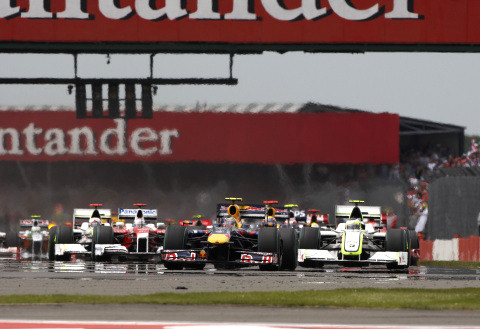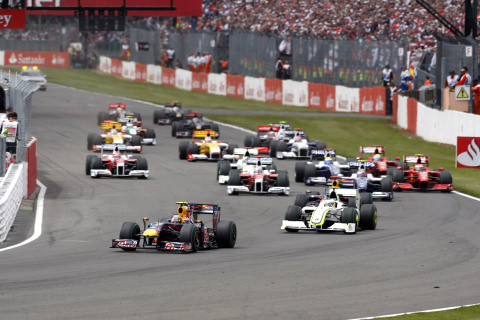The Way It Is/ F1's titanic power struggle
by Gordon Kirby Whatever you want to say about Formula One, it's enjoyed plenty of notoriety this year. On the track, Ross Brawn's team and Red Bull have entirely upset the applecart and with Ferrari, McLaren and BMW struggling F1 has a refreshingly different look this year. At Silverstone on Sunday, Sebastien Vettel and the Red Bull-Renault team staked their claim as serious contenders for this year's drivers and constructors championships. Vettel and teammate Mark Webber scored a dominant one-two sweep with Rubens Barrichello taking third for Brawn while championship leader Jenson Button had his least competitive race of the year finishing sixth behind Felipe Massa and Nico Rosberg.
Whatever you want to say about Formula One, it's enjoyed plenty of notoriety this year. On the track, Ross Brawn's team and Red Bull have entirely upset the applecart and with Ferrari, McLaren and BMW struggling F1 has a refreshingly different look this year. At Silverstone on Sunday, Sebastien Vettel and the Red Bull-Renault team staked their claim as serious contenders for this year's drivers and constructors championships. Vettel and teammate Mark Webber scored a dominant one-two sweep with Rubens Barrichello taking third for Brawn while championship leader Jenson Button had his least competitive race of the year finishing sixth behind Felipe Massa and Nico Rosberg.
Off the track, ringmeisters Max Mosley and Bernie Ecclestone have been fighting a fierce turf war with the F1 team owners over control of the series. This year's titanic duel with FOTA has been shrouded in FIA president Mosley's rhetoric about slashing costs and enforcing budget caps while enacting a continuing plethora of costly technical rule changes in recent years. The squabble reached boiling point last week when FOTA announced its eight teams will set up and run their own series next year. Mosley responded immediately saying the FIA will sue FOTA for breach of contract, etc., but he also said last weekend that he's sure that many months from now, possibly as late as next spring, FOTA will relent and continue to race in the FIA's series.
Of course, in typical F1 style this ongoing squabble has created a huge amount of media coverage. Mosley and Ecclestone are experts at this kind of thing but this year's wrangle is much more than the usual F1 political melodrama. It's about the overweening political and financial control Mosley and Ecclestone have established.

© LAT USA
With Luca di Montezemolo as FOTA's president, the breakaway group comprises Ferrari, McLaren, Renault, BMW Sauber, Toyota, Brawn, Red Bull and Scuderia Toro Rosso. The FIA has delayed announcing its 2010 teams but has approved Williams, Force India, USGP, Campos and Manor Racing. Near the end of last week Lola made a brief announcement withdrawing its F1 entry.
So will F1 degenerate into a CART/IRL battle with duelling series dragging the sport down and down? If there are two series, what engines will the FIA teams run? At this point, Cosworth engines are the only solution, but there are plenty of engine builders out there who could come up with something.
Much like CART back in 1996, the breakaway FOTA teams have the star drivers and brand names--Ferrari in particular--as well as humongous budgets. But where will they race? The FIA would for sure banish any track that ran a race for the breakaway series from running any FIA-sanctioned events and would also penalize the drivers in the same draconian way. Mosley has a very big stick, if not a bagful of sticks, and he knows how to wield them. You can say he's an odious character but he's deeply familiar with every millimeter of the terrain and is in his element, entirely reborn after his legal triumph last year over the News of the World newspaper.
Let's not forget that Mosley also got his way with McLaren, compelling Ron Dennis to step away from the race team and helping achieve the hollowing-out of a great team with Davey Ryan gone in disgrace and Tyler Alexander and Steve Hallam departing the premises at the end of last season. Without these old hands--the heart of the team--McLaren is having a tough time this year.
FOTA and other major critics like Jackie Stewart talk about the need to achieve better 'governance' and by that they mean removing Mosley's dictator-like position in favor of a more equitable working relationship. You can sympathize with them in many respects but I have no idea how they expect to remove Mosley.
Then of course there's Ecclestone's total control of all the commercial contracts with race tracks and sponsors and with TV companies in a couple of hundred countries around the world. For FOTA to challenge Ecclestone or establish workable contracts of their own will be extremely difficult.

© LAT USA
Of course, by most accounts last weekend's British GP at Silverstone was set to be the last of its kind, bringing an end to a sixty-year tradition. But it appears that the alternative--a redeveloped Donington and its promoter Simon Gillett--have been used as pawns by Ecclestone in an arcane needle match with the BRDC and Silverstone. Many people have believed that in the end Ecclestone will strike a deal to keep the Brit GP alive and at Silverstone last Saturday he changed his position, saying the race would continue at the track if Gillett is unable to complete the work required at Donington. Ecclestone told the BBC that the BRDC had made a turnaround of its own and was finally heeding his advice to take a much more commercial approach.
Meanwhile our own fifty-year tradition of F1 in North America has come to an end this year with no United States GP and the unexpected cancellation last fall of the Canadian GP. Montreal was one of the most successful F1 races in the sport's history with huge crowds and tremendous raceweek enthusiasm across the city. People drove and flew in from all over the American northeast as well across Canada and around the world. But the race couldn't pay as much as Malaysia, China, Singapore, Bahrain and Abu Dahbi.
Hope remains that Montreal will make a comeback, but I think it's unlikely. NASCAR has taken over le Circuit Gilles Villeneuve and the second-division Nationwide race has been moved to the end of August this year. This is a rare off-weekend for NASCAR's Cup drivers and teams and NASCAR is angling to have as many Cup drivers in the field as possible as well as hometown boys Patrick Carpentier and Jacques Villeneuve. 'Stock Car Montreal', the ISC-owned company that promotes the race, currently is repaving key parts of the track in preparation for the race. The Nationwide event has become Montreal's big race of the year and in time may become the first and only NASCAR Cup race run outside the United States.
The result of all this is that young Canadian drivers are more and more interested in pursuing careers in NASCAR rather than following the great Villeneuve family tradition in open-wheel racing. Exacerbated by the long decline of American open-wheel racing amid the CART/IRL squabble the USA's and Canada's open-wheel ladder system are in tremulously sad shape.
Almost half a century ago in June, 1961, Canadian race fans saw Stirling Moss win the first major race at Mosport, the Player's 200. Jim Clark turned up at Mosport a few years later driving a Lotus 23 with a 1,600 cc push-rod Ford engine and was beaten by Skip Barber aboard a more powerful twin-cam Ford-engined 23. None of today's F1 drivers would or could vaguely consider racing such an uncompetitive car but Clark not only drove it but enjoyed himself. He also ran a handful of pre-Can-Am, big-bore sports car races from Mosport to Riverside aboard the beastly and uncompetitive Lotus 30 and 40 sports/racers.

© LAT USA
We saw these drivers race at places like Bridgehampton, Watkins Glen, Elkhart Lake, Riverside, Laguna Seca and Kent, Washington, as well as at Mosport and St. Jovite in Canada. Many of them also ran the Indy 500 during this era. The big names from F1 in the sixties and seventies raced regularly in the United States and Canada in other categories against America's top road and oval racers and were much more well-known across North America than today's F1 stars. We also saw USAC stars like A.J. Foyt, Parnelli Jones and Lloyd Ruby race sports cars with great success, but that cross-pollination is long gone from the sport. The fact is racing as a whole beyond NASCAR enjoyed a much bigger footprint in the popular culture of those times than today.
Meanwhile, rumors suggest Bernie Ecclestone will visit the USA sometime in the next few weeks to talk to Pook and any others about plans they might have for a United States GP. Pook has been working for some time on a new venue somewhere in California and visited last year's Italian GP to discuss early progress with Ecclestone. When I talked to him last week Pook refused to confirm or deny his upcoming meeting with Ecclestone. Nor would Pook confirm any details of where his potential race might take place.
"I suspect the end of the drought of Grand Prix racing in the United States is near," was all Pook would say. "Formula One will not go on without a Grand Prix in North America."
Great words to hear. But can Pook successfully re-launch the United States GP without Ferrari, McLaren, Brawn and the other FOTA teams? And if FOTA finally comes to heel and accepts Mosley's dictates, how many of those teams will continue to operate and what kind of working relationship--'governance' if you will--will prevail in F1?
It's difficult to imagine F1 getting through this battle unscathed. And of course, the message from the disastrous CART/IRL war should remain hauntingly clear.
Over the weekend a friend sent a half-joking email. "Why don't we just have Tony George and Max Mosley trade places?" he wrote. "Both series would have the chance to work with a leader at the opposite end of the IQ scale from what they have been dealing with, and in both cases it couldn't possibly be any worse than their current arrangements.
"So why not give it a try? And if that worked maybe Bernie Ecclestone and Brian France could change places.
"I think," my friend added, "Jonathan Swift would have approved."
Truth be told, that's about where the sport is at.
Auto Racing ~ Gordon Kirby
Copyright 2009 ~ All Rights Reserved
Copyright 2009 ~ All Rights Reserved
Top of Page